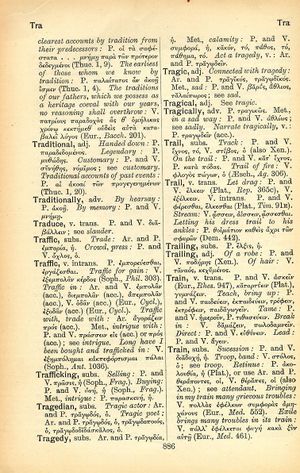train: Difference between revisions
From LSJ
Τῶν γὰρ πενήτων εἰσὶν οἱ λόγοι κενοί → Haud pondus ullum pauperum verbis inest → Denn der Armen Worte haben kein Gewicht
m (Woodhouse1 replacement) |
mNo edit summary |
||
| Line 17: | Line 17: | ||
===substantive=== | ===substantive=== | ||
[[ | [[succession]]: [[prose|P.]] and [[verse|V.]] [[διαδοχή]], ἡ. | ||
[[troop]], [[band]]: [[verse|V.]] [[στόλος]], ὁ; see [[troop]]. | [[troop]], [[band]]: [[verse|V.]] [[στόλος]], ὁ; see [[troop]]. | ||
Revision as of 10:14, 20 May 2020
English > Greek (Woodhouse)
verb transitive
P. and V. ἀσκεῖν; (Eur., Rhesus 947), καταρτύειν (Plato). γυμνάζειν.
teach, bring up: P. and V. παιδεύειν, ἐκπαιδεύειν, τρέφειν, ἐκτρέφειν, παιδαγωγεῖν.
tame: P. and V. ἡμεροῦν, P. τιθασεύειν.
break in: V. δαμάζειν, πωλοδαμνεῖν.
substantive
succession: P. and V. διαδοχή, ἡ.
troop, band: V. στόλος, ὁ; see troop.
retinue: P. ἀκολουθία, ἡ (Plato). or use Ar. and P. θεράποντες, οἱ, V. θέραπες, οἱ (also Xen.); see attendant.
bringing in my train many grievous troubles: V. πολλὰς ἐφέλκων συμφορὰς ἀμηχάνους (Eur., Med. 552).
exile brings many troubles in its train: V. πόλλ' ἐφέλκεται φυγὴ κακὰ ξὺν αὑτῇ (Eur., Med. 461).

